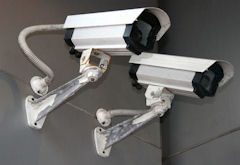 Spanish scientists have devised a way to make GPS accurate to within six feet, a development that will make it possible to improve maps and directions in cities where tall buildings block satellite signals, find and reserve parking spaces, and eventually to create smart traffic systems with GPS-guided cars. All very cool. But there’s a potentially dark side to the technology, too.
Spanish scientists have devised a way to make GPS accurate to within six feet, a development that will make it possible to improve maps and directions in cities where tall buildings block satellite signals, find and reserve parking spaces, and eventually to create smart traffic systems with GPS-guided cars. All very cool. But there’s a potentially dark side to the technology, too.
Imagine if cars linked speedometers to the GPS technology, writes Jim O’Reilly in UBM’s Future Cities blog, could a city or county fine you every time you busted the speed limit? Could your local government fine you every time you parked in a handicapped space? “This issue will be on the table in a couple of years,” he says. “Already, countries like Britain are deploying huge networks of computerized cameras to trap speeders and know where your car is.”
Combine surveillance cameras with face recognition software. Might it be possible one day, O’Reilly asks, to spot sex offenders loitering around schools? Could government track you wherever you go?
The technology will be here before we’re prepared for it. The civil liberties questions are profound, and they intersect with the state/local level of governance. Virginians need to start thinking about how it should be used. Either we control the technology, or it will control us.
— JAB


